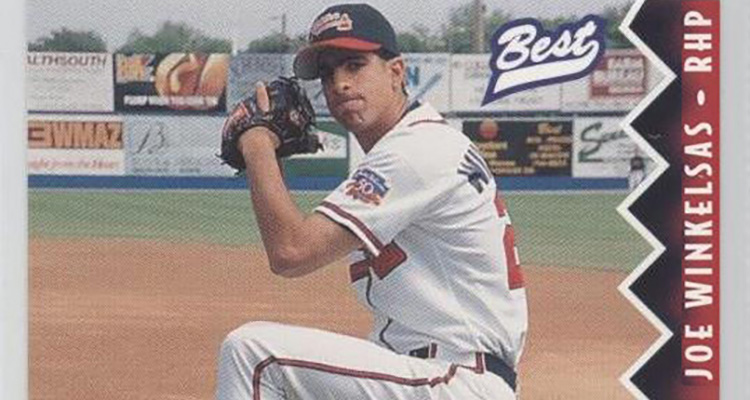Even the most devoted fan of the Milwaukee Brewers would forgive you for not knowing the name Joe Winkelsas. Though the unheralded relief pitcher’s Major League career technically spanned seven years and found him suiting up for two teams during parts of two centuries, the entirety of Winklesas’ tenure in professional baseball can be distilled to just 151 pitches (80 strikes), seven and a third innings of work, an ERA that’s on the doorstep of 10, four strikeouts, and exactly zero wins for his team during games he played. He hasn’t pitched in the Majors in a decade—exactly a decade, in fact—with June 9, 2006 being his final game (see previous sentence for game result). Today marks the 10-year anniversary of the first day of the rest of Joe Winkelsas’ life.
He was a big leaguer for a total of 36 days, working just eight of them. Save for the sole defeat on his 0-1 career win-loss record, Winklesas never had a chance to contribute to any remotely competitive moments during his blip in the show, which—coupled with his minimal service time—only added to his anonymity among fans. When many of those 151 pitches (80 strikes) were being thrown, you were probably making your way back to your car in the Miller Park lot or you’d turned the channel innings earlier, having already accepted defeat. Basically, he was on the mound during those forgotten contests to spare the arms of more talented men who would be called upon in more promising circumstances during better days at the ballpark.
In essence, Winkelsas was the baseball equivalent of a garbage man, tasked with cleaning up the insurmountable messes and cluttered basepaths left by better pitchers. It wasn’t ideal and the numbers indicate he didn’t exactly excel at it. Sometimes he even added more trash to the pile before eventually sweeping a frame clean in sloppy fashion. While it wasn’t a particularly glamorous duty, it was far more favorable than the job Joe Winkelsas held before wearing a Milwaukee Brewers uniform: an actual garbage man. Nothing against trash collectors, but Major League pitcher is on a whole different level.
Winkelsas’ big league saga actually starts in 1999, as a member of the Atlanta Braves. The 25-year-old hurler worked his way through the minor league system of the team who signed him as an undrafted free agent in 1996 and managed to crack its Opening Day roster. He was called upon to pitch in the sixth game that season. That Major League debut turned out to double as his deathblow, with Winkelsas surrendering four hits, two home runs, and walking a pair of Arizona Diamondbacks (one intentionally) before finally getting one batter out. The Braves—who would win 103 games and the National League pennant that season—sent him back to the minors the next day, where he languished until being released partway through the 2003 season. He had a stint in rehab (for marijuana) along the way.
Following his Braves release and a couple shaky seasons in independent baseball, Winkelsas returned to his native Buffalo, New York in 2005, where he worked as what he called “a sanitation engineer.” Though his Major League journey was assumed over, baseball remained in his life. He became the pitching coach at Niagra University in 2005. It was there that a Brewers scout (re)discovered Winkelsas’ arm, which the pitcher claimed was restored by hauling garbage cans. He agreed to a bullpen session “on a bet” and in 2006, he was assigned to Milwaukee’s double-A affiliate. On May 23, he was promoted to help stop the bleeding during seven out-of-hand losses for a makeshift Brewers squad that would lose 87 games by year’s end. Winkelsas, then 32, would be demoted on June 21, less than a month into his big league return. He would be released that offseason, bounce around the minors, and officially retire in 2008 with an ERA of 9.82.
It’s not exactly a plot that has the makings of a crowd-pleasing sequel to Disney’s The Rookie. In fact, with its drug references and a grimy second act set in a blighted industrial town near the Canadian border, the leading role would be better-suited for Randy Quaid than Dennis Quaid. Like most (or all) of its protagonist’s all-too-brief career, you probably wouldn’t watch it. The true events on which that ill-fated film would be based came to an abrupt and unannounced conclusion exactly 10 years ago when, without even knowing it, Joe Winkelsas would be living his first day of his post-pro pitching life. Hours prior, he was rocked for three earned runs on two walks and two hits in a rough fourth inning against the Cardinals. It was there, Winkelsas—who came into that game with career record of 0-0, which was unchanged since the preceding millennium—became somebody. That somebody was a loser, but also somebody who had waited so long and endured so much just to have that chance to fail a second time.
“Sometimes a rocky road can lead to a beautiful place,” Winkelsas told Brewers beat writer Adam McCalvy the same day at his 2006 promotion to Milwaukee’s roster. Beauty can take many forms. Beauty fades. Sometimes things aren’t as beautiful when you get a chance to look at them up close. Yet the 32-year-old garbage man-turned-garbage-inning pitcher is surely thankful he got to spend seven years on that rocky road to spend 30 more days in a beautiful place.

